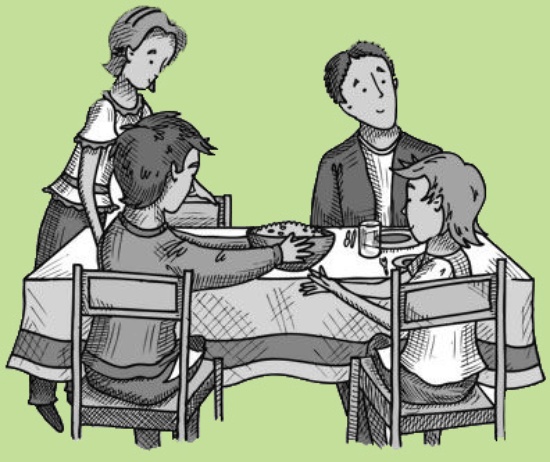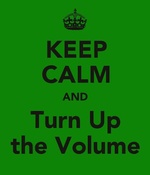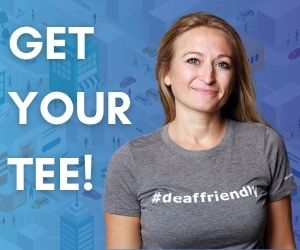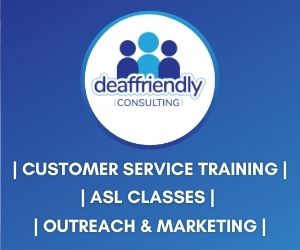7 Ties That Bind all Children of Deaf Adults (CODA)
Posted by: Staff Writer on Dec. 3, 2012

Ask anyone from the mainstream what a CODA is, and you’ll get answers like “Led Zeppelin’s album,” or “the tail-end of a music piece.” Close, but no cigar ... at least not from the Deaf Community. “MOTHER + FATHER + DEAF” (the signs used to describe a CODA) are statistically common within the community.
According to the National Institute of Health, about 90% of infants who are born deaf are born to hearing parents. But on the flip side, CODA International reports that 85% to 90% of deaf adults statistically have hearing children. In our culture, these children are lovingly dubbed “Child of Deaf Adults (CODA).”
San Diego-based CLIP Interpreting, Inc. founder Dustin Pelloni is one of them. Also, Cornish College of the Arts senior Mark Murray, a CODA wrote, produced, and acted in a short play called “CODA” (performed in Seattle during the month of September 2012). Along with Lou Fant (sign language coach for Children of a Lesser God) and Edward Gallaudet (founder of Gallaudet University), they belong to a cultural tribe that is literally borne from Deafhood.
CODAs come in all shapes, sizes, ethnicities, and upbringings ... but they all tread with one foot in the deaf community, and the other in the hearing world. Let’s explore a few ties that bind CODAs:
-
The Epiphany strikes in early childhood
When does a boy raised by wolves, realize that most boys are not raised by wolves? Epiphany is a defining moment in a CODA’s life.
“To little Dustin it seemed that the ratio of Deaf mothers, and Deaf fathers really, was about 50/50,” recalled Pelloni. “The epiphany came when I realized that all the moms of the other kids in my class could talk to each other and that my mom was all by herself because she was unable to communicate.”
For Murray, the epiphany came through a friend. In a scene when he is about 7 years old, he discovers with shock that (most) parents do not sign. “What’s sign language?” his playmate asks in wonderment. “You mean … your parents aren’t deaf?” Murray responds with equal wonderment.
-
They pull CODA pranks (because no one else can)
 Boys will be boys, but CODAs may have the upper hand in the trickery department. In a scene inspired by real life, Murray pranks a friend (who is unaware his folks are deaf). As the two sneak into his house late at night, the friend is warned that Mr. Murray sleeps with a shotgun. They must tiptoe very quietly. Suddenly, the mischievous CODA breaks out into ear-piercing screams of “FIRE!” Hilarity – and a near-heart attack – ensues, but no shotgun.
Boys will be boys, but CODAs may have the upper hand in the trickery department. In a scene inspired by real life, Murray pranks a friend (who is unaware his folks are deaf). As the two sneak into his house late at night, the friend is warned that Mr. Murray sleeps with a shotgun. They must tiptoe very quietly. Suddenly, the mischievous CODA breaks out into ear-piercing screams of “FIRE!” Hilarity – and a near-heart attack – ensues, but no shotgun.
“It is a common misconception that … because she is Deaf that my Mom and I have some sort of different relationship, but the reality is that she and I are just like any other mother-son tandem,” Pelloni observed. But still, CODAs can prank their folks like no one else can:
“All CODAs learn one lesson very early in life: The greatest way to get a slipper to the face is to close your eyes when your Deaf mother is yelling at you. Also, the best way to get back at her for throwing the slipper in your face is to put your CD player (turned on and volume all the way up) into her purse when she goes to the grocery store.”
-
What sucks more than being bullied? Seeing your parents bullied – or oppressed
If scoring the perfect prank is a high, then bullying is one of the lows of being a CODA. Deaf parents are fodder for ignorant bullies, which “CODA” explores in a scene where Murray deals with a sneering high school bully who likens sign language to “hand tourettes” while pantomiming mental retardation.
People waiting in the line at Ralph’s would whisper to each other, while staring at young Dustin and his mother using sign language. “The least awesome part about being a CODA was dealing with kids older and bigger than me making fun of my mom,” said Pelloni.
Then there’s the subtler bullying, or oppression and lack of accessibility. Murray pantomimes the school principal’s baffled reaction when he realizes he’s been talking to a confused deaf man (Mr. Murray). No terp has been arranged for this critical parent-principal meeting.
Pelloni’s mother’s health was once jeopardized by faulty sign language interpretation that led to incorrect medication. A week after an agency sent an interpreter for her doctors appointment, hallucinations and paranoia began. She brought her son along to see the doctor again. There, Pelloni met an interpreter wearing a badge with the word "certified." The terp was slow to understand his signs, leaving Dustin to sim-com. When asked for a name and certification, the reply was: “I have an RID."
“The Registry of Interpreters for the Deaf or RID is an organization and not a certification. Upon, further review, I found that this interpreter has completely misrepresented them. Later, I find that the doctor had mis-prescribed my mothers medication as a result of a simple misinterpretation,” said Pelloni. The experience drove him to establish CLIP Interpreting.
-
CODA experiences are so powerful, it drives adult careers and creativities
Necessity is the mother of invention. That’s true of many CODAs who gravitate towards Deaf-oriented careers. Lydia Callis – the daughter of a deaf mother and deaf siblings - is one of them. CODAs start deaf schools, become interpreters, teach ASL, and channel their expressiveness to excel in acting/theatre.
“CODA” is Murray’s senior capstone project inspired by a hearing brother, Deaf father, and a mother with Usher’s Syndrome. “Every other scene, I took ideas and how I felt about them and created a scene around that,” Murray explained. His other play is about two CODA brothers who think that their parents are lying about being deaf, and are really spies plotting against them.
Not many people fresh out of high school can begin working professionally at a craft. But Pelloni passed an interpreter rating system called the Educational Interpreters Performance Assessment, so he began working professionally as an agency interpreter while still in his teens.
-
By blood and by language, they are one of Deaf Culture’s gatekeepers
Murray said his play is “targeted at an audience that has no connection to the Deaf community or any insight on what it is like to grow up as a CODA.” Says Cornish College adjunct professor Elizabeth Herron, who teaches the senior workshop at Cornish:
“(Deaf Culture) is completely something I had no understanding of, and it’s seen from the perspective of both a child and adult who has to straddle both worlds. Given that (Murray) is coming from that environment, it’s not just an outside perspective. It’s authentic.”
-
Yes, they play loud music (with one exception)

Walk into a deaf household, and enjoy a “no noise ordinance” stronghold. The 7-year-old Murray’s friend loves to hang out at the Murray household, because “we can play Battleship really loud.”
But beware, eager rapper wannabes. Deaf people are just as sensitive – if not more so – to bass music. It vibrates in our bones … through dance floors and tables, from the soles of our shoes to the top of our heads.
“A warning I would give to all CODAs … is to make sure the bass is turned all the way down before turning the music all the way up,” cautions Pelloni.
-
Loud music aside, a CODA’s greatest gift is language
Being a CODA, says Pelloni, often means “receiving the gift of sign language. That being said, not all CODAs are as blessed as I was growing up. CODA simply means Child of Deaf Adult and not: child of deaf adult who uses sign language and teaches it to their children.”
For many CODAs, their language is firstly signed, then secondly spoken (English). In Pelloni’s case, spoken Spanish and some Mexican Sign Language came third and fourth.
Murray’s father is the 12th child in a large family where no one signs. His son cannot fathom the bleakness of being unable to communicate with one’s siblings. Sure, Mark Murray has power struggles, strained by adolescence and dating. But his parents show love in subtle ways. They barely interact with his new girlfriend, but affectionately give her a name sign. Now that’s a true gift from a deaf parent.
Are you a CODA, or do you have one in your life? Then you may know that this article only lists the tip of the intricate, complex iceberg that is a CODA’s experiences. Perhaps you may now wonder about the experience of deaf parents whose children live in a world of sound – now that would be a whole ‘nuther acronym and perspective to explore!
Tags
- deaf
- hard of hearing
- deaf blind
- deaf friendly
- deafhh
- coda
- led zeppelin
- deaf community
- clip interpreting
- dustin pelloni
- cornish college of arts
- mark murray
- lou fant
- edward gallaudet
- oppressed
- rid
- registry of interpreters for the deaf
- educational interpreters performance assessment
- deaf culture
- lydia callis
- marlee matlin
- my deaf family




Comments